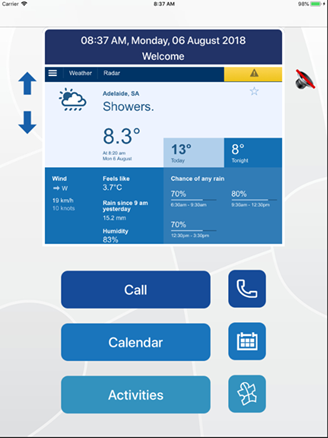
Caring Futures Institute and Flinders Digital Health Research Centre researchers have developed a computer tablet based solution which helps people who are starting to lose their memory.
The Flinders Assistant for Memory Enhancement (FAME), developed by Professor Anthony Maeder, Professor Jennifer Tieman, Professor Sue Gordon and Dr Lua Perimal-Lewis together with partners Dementia Australia and Southern Cross Care, combines brain-training exercises, an interactive calendar, and a contacts list into a solution that combats the most common effects of memory loss.
“You can’t replace the brain, but you can give people tools to fill the gap that memory loss is causing,” Professor Maeder explains.
This solution is part of a growing trend where models of care are changing to include roles for patients and caregivers, rather than just for health professionals, with a greater focus on proactive and preventative health responsibilities for consumers.
“Health care is shifting from fixing problems to helping people along the journey – whatever their journey is,” Professor Maeder said.
FAME aims to help users address memory loss issues such as orientation (remembering location and context), people (remembering names, relationships and contact details), activities (remembering appointment times and places) and interventions (understanding and managing memory loss).
An integral part of the team’s approach is the use of ‘living laboratory’ methodology, where all stakeholders including consumers are closely involved in the project from its inception, and consulted repeatedly at several stages throughout the research and development process.
“Rather than build software and ask people to use it, we first ask what they want, then ask them again, then show them a glimpse of what they asked for and check if it’s still what they want. This iterative approach, using our customised living laboratory practices, leads to a better solution and easier adoption,” Dr Perimal-Lewis said.
“We did a lot of groundwork to determine the appropriate elements for the system we were going to build. Most people wanted to know, what day it is, what the weather’s like, how to phone their son, daughter, or carer, what they’re supposed to be doing today and their upcoming needs for the next few days.”
To achieve this, the FAME app accesses existing information services, such as clock and weather, phone contacts calling list, and calendar. It also incorporates brain training functionality and tools to collect additional data about user interaction and experience.
“We ran this project as a full development cycle, designing the solution from absolutely nothing to building a working prototype, testing it, deploying it, running a multi-arm pilot, and now we’ve just finished a series of interviews with participants to help us evaluate their experience with the product.”
Despite initial concerns that digital technology may not be attractive to people over the age of 65, the response to this research was overwhelmingly positive. For some, technology is a part of their daily lives, while for others, it is something very new.
During the pilot, a very high percentage of the 120 participants engaged with using the tablet solution for more than an hour per day over the whole 12-week period.
The participants who used the solution frequently reported an increased sense of clarity in the implementation of their day-to-day tasks.
Further analysis of the results is underway, with the project to be extended into 2020.
Professor Maeder said the team is pursuing opportunities to adapt and redeploy the solution for different health purposes.
“We have recently been speaking with colleagues in Germany, who see the solution as more widely applicable in aged living settings, about undertaking our first international collaboration with them.”
The promising result demonstrates the Caring Futures Institute’s focus on research that leads to better care and health outcomes across the lifespan and develops self-care and caring solutions to improve people’s quality of life.

